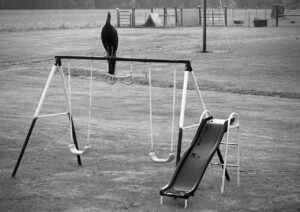
Photo by John Griswold
Kevin is a peacock who ranges freely among several farms in rural Southern Illinois.
“Kevin is nuts,” says Lee, who lives on one of the farms. “He likes to boss the chickens around.”
Kevin “belongs” to the farm family across the county road and fields. Lee hears that people think peacocks are pretty, but they are supposedly good with pest control too. There used to be three more, but Kevin is now a rare bird in these parts.
Lee is my cousin. I had not seen him since we were kids playing on the front steps of the house of his grandma Ruby, my maternal aunt. We reconnected in 2018 through 23andMe and made plans to meet, but my family was living in Louisiana, then Covid hit. I took my boys to meet him last weekend. They are interested in knowing other kin and hearing their stories, the only buffer against the flight of time.
Lee’s farm, 240 acres of corn and soybeans, is in a family trust. It has a five-acre pond well-stocked with a variety of fish, ducks, and snapping turtles. The first reminder of being back in the countryside is the problems of managing nature. The pond has algae growth, perhaps caused by climate change, and the turtles eat the ducks from below.
Lee’s friend Neva shows us the chicken coop, barn, and animal pens. She talks to the animals, fusses over and pets them, feeds them. Lee has the fattest, sleekest chickens I have ever seen—with the expected multi-dozens of eggs in Lee’s and Neva’s refrigerators—two pigs, a young steer, and a lamb to keep the steer company. The steer and lamb lie together in the hay next to the disintegrating bale in their pen. Neva exclaims at how the steer frolics, like a puppy, which he learned from the lamb.
Neva was raised on a farm and has castrated and slaughtered animals. She says she may keep the steer as a pet, she doesn’t know, and we discuss the cost of feed for a full-grown animal. The pigs are only a few months old but will be slaughtered in a couple more months. She speaks to them lovingly and reminds them they will be on a plate soon. They like to bite her shoes, and she has tricks to keep them distracted when she is in the pen, digging their water bin out of the mud where they like to half-bury it.
The animals all have names, but there is too much going on and rudely I do not remember most of them. They are clearly of the family, despite their various fates, even Murphy and Charlie, the pigs.
Kevin, I remember. Lee says Kevin is in love with the ducks. Kevin swells and shouts, Help, help, help! but the two ducks present look at him and waddle away. Kevin flies, trailing his long feathers, through the light rain to the roofline of the barn. Neva laughs and says his pea brain thinks he will not drown up there. They have left a huge dead tree standing next to the driveway because he likes to roost on its bare branches.
He flies down and is nearly underfoot. It had not occurred to me he might be aggressive. Neva says he is more afraid of me than I am of him. I look to see if peacocks have spurs, but Kevin is on the move, like the last of the dinosaurs stalking through the grass.
When we go in the garage he flutters to the sidewalk handrail to watch us through the window. When we go in the house he flutters to the top of the swing set as if waiting to play.
Inside the farmhouse a blind little dog knows its way around and never bumps into furniture or loses its way to bed or bowl. A skinny tuxedo tomcat takes possession of new laps.
Any time I have wanted to mine colorful stories about our family for my sons, they came from Lee’s side of the family. Ruby, my mother used to say, always walked out her back door in my hometown on Sundays and grabbed a chicken for dinner. She whirled it around over her head by the neck until its head came off in her hand, then she would wait until the body stopped running around. Her husband, my uncle Wallace, and their son, Billy Joe, a 6′ 9″ giant who drove a Lincoln Continental with his bald head sticking out the sunroof, used to have the local slot machine, pinball, and cigarette vending machine concession, reputedly by the graces of the Chicago mob.
But on this day, colorful means Kevin. After a good talk, a good meal, some playtime in the mud in a four-wheeler, and several mini-cannon shots that all the animals ignored, my sons and I said goodbye to Lee and Neva and got ready to leave.
As I tried to back out, Kevin had his back up in the driveway and refused to budge. I eased back until I could not see him behind my car anymore. I laughed and told the boys Kevin was like, Come on, bring it….
Jack, following some natural instinct, jumped out of the back seat and ran toward the peacock, shouting, Buh-gock! Kevin ran off toward the house, head thrust forward, a dandy in an iridescent coat and sodden crest, looking for acceptance.
